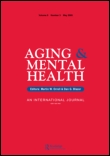 | |
| Discipline | Aging, mental health |
|---|---|
| Language | English |
| Edited by | Martin Orrell, Rebecca Allen, Terry Lum |
| Publication details | |
| History | 1997-present |
| Publisher | |
| Frequency | 8/year |
| 3.658 (2020) | |
| Standard abbreviations | |
| ISO 4 | Aging Ment. Health |
| Indexing | |
| CODEN | AMHTFD |
| ISSN | 1360-7863 (print) 1364-6915 (web) |
| OCLC no. | 36731481 |
| Links | |
Aging & Mental Health is a peer-reviewed monthly scientific journal published by Routledge covering research on the relationship between the aging process and mental health. The editors-in-chief are Martin Orrell, Rebecca Allen, and Terry Lum. [1]